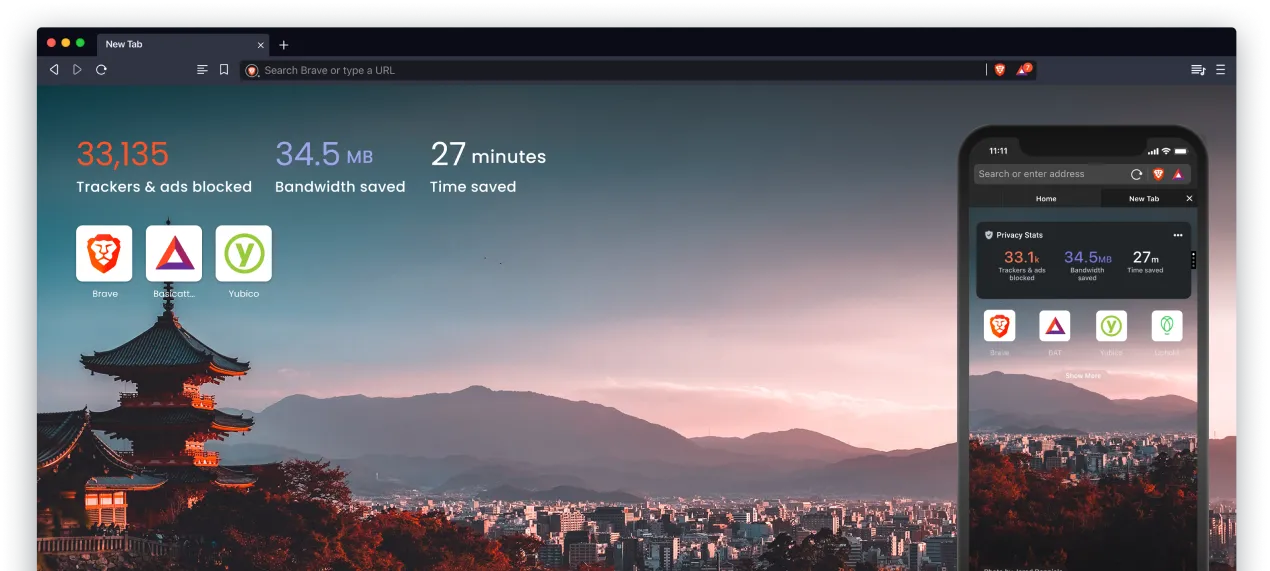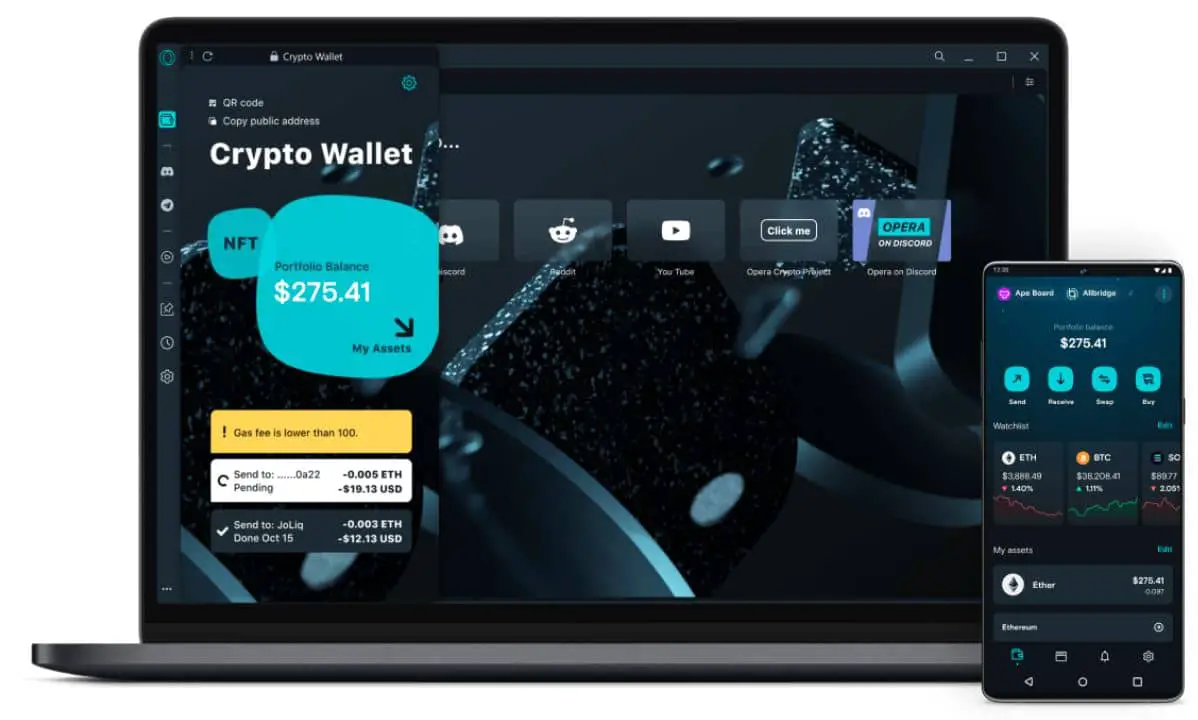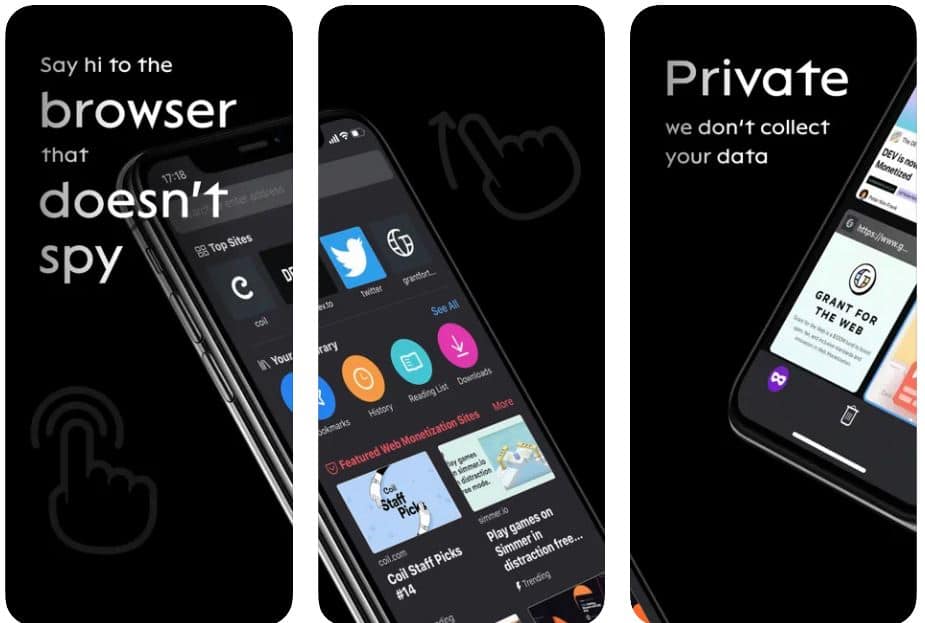Are you looking for the best Web3 browsers? If yes, you have stumbled on the right webpage. In this article, we are going to discuss what these Web3 browsers are, why they are used, and some of the best ones that you can use.
So, without any further ado, let’s get started –
Web3 Browsers – What do we know about it?
I still remember when I was a kid, people around me were not so familiar with the internet. The internet was quite alien to them, and now, after a couple of years, we can see that the internet is the backbone of today’s world. From paying bills to sending money, the internet is connecting the world.
Similarly, the hottest topic among tech enthusiasts nowadays is Web3 browsers, especially amongst crypto enthusiasts. This transition from traditional web browsers to these browsers has made tremendous changes in the usability and functionality of the web.
But the question is, what these browsers are, their benefits, and the main use of these browsers. To better understand this, you must understand what these web versions are, their shortcomings, and how Web3 appears as a solution.
Web 1.0 and Web 2.0 – A Brief History
The internet started with Web 1.0 when websites were nothing but static web pages containing data and content deriving from static files. There was not so much interactivity, and therefore, people often consider it the read-only web.
Web 1.0 was similar to newspapers and magazines, where you could only read the content published by other organizations. Individuals didn’t have much to create their blogs or publish their content, and social media was just a concept.
These things changed with Web 2.0. Web 2.0 is the internet that most of us are familiar with and use daily. It is the web of social media platforms, apps, and websites that contains dynamic data. This web allows people to upload their content on various platforms.
Even though Web 2.0 offered a significant improvement in the quality of apps used to access internet services, it has also been plagued with some serious concerns. The very first one is privacy.
Web 2.0 is considered a nightmare for privacy, and one of the reasons is that Web 2.0 is free. Since users are not paying anything to use their services, companies find a new and dark way to monetize their users. Companies started collecting personal data about users, such as their data, likings, interest, and more.
They started profiting off this data from highly targeted ad spaces they sell to online sellers and advertisers.
For example, if you are looking to buy shoes online, you will see disturbingly accurate advertisements for similar shoes across all the websites you visit. Not only that, but you can even get similar ads in your email inboxes as well as a social media news feed.
In Web 2.0, it is almost impossible for users to control where their data is collected, how it is stored, and how companies use it. Tech giants trade your data to allow you to use their apps. Since they are not selling you any product or something directly, you and your data become the product they sell.
Another drawback of Web 2.0 is that it is based on the concept of centralized authority. For example, think of governments, big tech companies, and more. These authorities verify who you are, your online transactions, purchases, what you can publish and what you cannot, and more.
This sounds like a dictatorship, and sadly, we can do nothing about it. Even though there are some laws like Europe’s GDPR and California’s CCPA that provide more control to disclose what data is being collected, how and where it is stored, and how it is destroyed, the core problem remains the same – the centralized authority.
What is Web3, and how is it trying to solve these problems?
Web3, also known as decentralized web, integrates decentralized applications (dApps) and decentralized finance (Defi) such as cryptocurrencies, tokens, assets, and more. This web heavily relies on blockchain and decentralized networks.
A decentralized network is an architecture that distributes the workload across hundreds of servers instead of relying on a single server. A server in a decentralized network can be anything – a black box in a server farm or a computer. You can even offer your machine to be a part of this decentralized network, and in exchange, you may get rewarded for your effort.
Blockchain follows a similar concept. A blockchain is a distributed database, often referred to as a distributed ledger, that is shared amongst the nodes of a decentralized computer network. Similar to traditional databases, blockchain also stores information in digital format.
But unlike traditional databases, blockchain doesn’t host its data in any central authority or host. This database is stored across thousands of computers and servers. This data is publicly accessible by everyone in that network. As a result, it guarantees the security and fidelity of a data record without the need for a centralized or third-party authority.
Since your database is stored on thousands of computers and servers in the network, it is more resilient against hacking. This is one of the reasons blockchain is known for its crucial role in cryptocurrency to maintain a secure and decentralized record of transactions.
To access Web3, you will need special web browsers called Web3 browsers.
What are Web3 Browsers?
On the surface, you will hardly notice any difference between Web3 browsers and our regular browsers. it looks quite similar to Web 2.0 browsers in terms of functionality and features. However, the biggest difference between these browser versions is that Web3 browsers integrate functionalities related to blockchain and help you connect to the decentralized web.
These browsers make it easy to make crypto payments and are more privacy-focused. While using these browsers is like using regular browsers, if you want to enjoy the features and functionalities of these browsers, you need to have some basic knowledge of stuff such as cryptocurrency wallets, dApps, blockchain, and more.
Some of the benefits of browsers –
- It lets you connect with the decentralized web.
- These browsers are more privacy-focused.
- it offers a faster web experience and seamless user experience.
- These browsers help a lot in IoT communications.
- This will allow you to make on-the-web crypto payments.
Here, we have prepared a list of the best Web3 browsers –
Best Web3 Browsers – Our Top Pick👌👌
1. Brave Browser
Brave browser (Download Here) is one of the top-rated Web3 browsers with over 25 million users worldwide. The best thing about Brave is that it is open-source in nature and boasts some amazing functionalities. The best thing about Brave is that it is completely free to use without any limitations on functionalities and features.
The browser is based on the source code of the Chromium browser, and that is the reason this browser looks and feels like Chrome.
However, the developers of the Brave browser have removed the lines of codes that can compromise user privacy. This takes user privacy to the next level.
Unlike other web browsers, Brave doesn’t collect your data to make money. It runs an advertisement model where users can decide whether they want to see personally curated advertisements or not.
Brave is also quite a functional and feature-rich web browser. Some of the best functionalities of the Brave browser include a built-in ad-blocker that blocks all types of ads without installing additional extensions or add-ons.
It also has an HTTPS Everywhere feature that automatically blocks all the websites that don’t have an active SSL to avoid data leak-related issues.
This browser even comes with an in-built cryptocurrency wallet, allowing you to make crypto transactions on the go. Brave also has a native Ethereum-based ERC-20 token, known as BAT or Basic Attention Token.
The best thing about the Brave browser is that it lets you earn passive income in the form of BAT tokens. For this, users have to enable curated advertisements.
The good thing about these curated advertisements offered by Brave is that Brave lets you select the amount of time a user wants to devote to the advertisements. Users can simply increase the time they want to spend on advertisements or completely turn them off anytime. Users also control the type of ads they are interested in.
Besides that, Brave boasts a sync feature that lets you use your browser data, such as bookmarks, extensions, history, and more, across multiple devices. Brave also offers its search engine, which covers the basics well.
However, I feel that the Brave search engine requires some development. In the meantime, you can use other search engines such as DuckDuckGo, Google, Ecosia, Bing, and others.
Another very impressive thing about the Brave browser is that it supports IPFS. It is a decentralized file storage protocol that helps in reducing the concentration of data by distributing it on a global network.
Brave offers a Shield feature that lets you configure how you want to surf the internet for the desired privacy to take your privacy to the next level.
Key Features:-
- Much faster than other web browsers
- It feels similar to Google Chrome, offering an overall great user experience.
- User privacy-focused – offers a bunch of privacy-related settings and features.
- Let you choose whether you want to see ads and if yes, you can get rewarded.
- It is blockchain integrated and supports crypto wallets
- It has its Ethereum-based ERC-20 token called BAT
- It has a built-in P2P file hosting solution
- Available for all major devices, including Windows, Linux, macOS, Android, and iOS
2. Opera Crypto Browser
Opera (Download Here) is one of the most popular browsers. It was quite popular as a Web 2.0 browser and was widely appreciated for its speed, efficiency, and focus on privacy. The Web3 version of Opera is quite the same but with more functionalities and features.
Opera browser now supports decentralized web as well as dApps, meaning now you can access blockchain websites without worrying about security. You can also access the massive collection of dApps.
Web3 Opera has also introduced a built-in crypto wallet that lets you easily store, exchange, send, and receive tokens and cryptocurrencies. You can simply sign in to your account and link your wallet address for faster transactions.
Currently, this wallet only supports ETH, TRX, and CBK, but Opera is working on adding more networks that we can see shortly.
When you use this Opera Wallet, your wallet’s private keys will be stored directly on your smartphone, meaning your smartphone will be the physical wallet for your multi-wallet. Whenever you sign in to your Opera Wallet, you will be required to use these private keys. This makes the transactions more secure and safe.
It is based on Chromium source code, but the developers have tailored the source code to enable Web3 functionalities and enhance user privacy. Developers have also included a Crypto Corner page where you can find all the latest news, event calendars, NFT galleries, upcoming airdrops, forums, and more related to cryptocurrency and blockchain.
Key Features:-
- Support all types of dApps
- Boasts an integrated multi-network crypto wallet
- Supports Web3
- It comes with a built-in ad blocker
- Supports Ethereum, ERC-721, ERC-20 tokens, and NFTs
- Available for all major devices such as Windows, macOS, Linux, Android, and iOS
3. Osiris Browser
Osiris browser (Download Here) powered by Acent is another very popular Web3 browser that is blockchain-friendly. One major difference between Osiris and Brave or Opera is that Osiris is more of a consumer-centered browser and always focuses on the users’ needs to provide appropriate solutions.
The thing that makes Osiris a better choice than Brave is its revenue model. Even though Brave claims to be a secure and privacy-centric browser and offers aggressive ad-blocking and anti-tracking functionalities, it relies heavily on advertisements for revenue.
Osiris also blocks advertisements and trackers by default and uses a zero-ads business model. Instead of advertisements, Osiris uses a well-architected revenue model through its Metawallet and the Acent mainnet.
It runs on the Acent blockchain, which is supposedly faster and more compatible than the Ethereum network, and helps them generate revenue by increasing the utility of ACE (Acent).
This browser boasts an integrated Metawallet. Unlike Metamask, Metawallet is exclusively available on the Osiris browser only. This wallet functions as a Layer 2 solution that provides faster transaction times and also serves as a bridge between other blockchains.
That, too, while avoiding higher transaction fees. This Metawallet supports ETH, ACE, and TRX, but the integration of DOT and BSC is on the way.
The UI of the browser is quite similar to Chrome, which makes it very easy to use. It lets you select your default search engine and enable Osiris Armor to block all intrusive ads and trackers to improve user privacy. You can visit the Osiris dashboard to see how many scripts and ads Osiris Armor has blocked.
Being a Web3 browser, Osiris supports dAppstore, a marketplace where you can find decentralized applications. It is one of the biggest blockchain platforms continuously growing in the global market. Osiris is also working on building its mainnet. This is the first time a browser is working on its mainnet.
Osiris is also working on a built-in and free VPN service to make your browsing more secure and safe. Currently, it is only available for Windows, Android, and iOS. It doesn’t support Linux and macOS, which is a major drawback.
To sum it up, Osiris is a very promising privacy-centric web browser that you can use. However, it is still in its early stages, and therefore, it has some bugs that you may encounter now and then. Availability of the browser is also a major concern.
Overall, I highly suggest you try Osiris but don’t completely rely on it or make it your default browser.
Key Features:-
- Supports dAppstore
- Osiris Armor is a quite powerful function that blocks all sorts of trackers and advertisements.
- The browser is quite fast with its hyper-speed browsing
- It doesn’t rely on the advertising revenue model
- Quite secure and boasts many privacy-centric functionalities
Download the App on Google Play Store
Download the App on Apple App Store
4. Puma Browser
Next, we have Puma Browser (Download Here) on our list. It is an amazing Web3 browser but is only available for smartphones. Currently, it only supports Android and iOS, but due to its rapidly growing popularity, we can hope to see the desktop version in the future.
It is a privacy-centric browser, meaning it doesn’t track your online activity. In addition, it blocks all sorts of advertisements and trackers by default that enhance your overall privacy and protect your online activity.
Puma browser supports decentralized web and has collaborated with Handshake, a decentralized domain management system. These decentralized domains are donated by backslash (/) instead of other domain name TLDs. You can access decentralized websites with the Puma browser very easily.
Since the Puma browser doesn’t rely on an advertising revenue model, it has Coil. The coil is based on the web monetization philosophy that states that users should pay the creator/author for the content they have consumed.
Therefore, Coil boasts a subscription-based service, costing you $5 a month, that gives you access to content only available behind the paywall.
The best thing about Coil is that it collaborates with many well-known giants such as Twitch, Imgur, and more. This means you can easily access premium content available on these platforms, and Coil will pay the fee to the creators directly.
Another good thing about the Puma browser is that it supports peer-to-peer file hosting functionalities.
Key Features:-
- Privacy-focused browser
- Available for both Android and iOS platforms
- At least three times faster than regular browsers
- Blocks all sorts of ads and trackers
- Supports decentralized websites
- Incentivize creators and authors via Coil
Download the App on Google Play Store
Download the App on Apple App Store
5. Beaker Browser
Lastly, we have the Beaker browser on our list. It first appeared in 2016 by Blue Link Labs. Like many other browsers, Beaker is also based on Chromium source code.
However, the major difference between Google Chrome and Beaker is that Beaker uses the Hyper protocol and HTTP.
The Hyper protocol starts with hyper:// instead of HTTP:// and boasts some really powerful features. For example, the Hyper protocol is fast, secure, and decentralized. All the archives change hosts from time to time without changing the original URL.
Whenever you visit a decentralized website on Beaker, the website’s content gets downloaded to your computer as per your requests. Once you have downloaded something from a Hyperdrive website, you will be temporarily seeding that file for a small amount of time. You can even choose to seed the website permanently to help the creator.
However, the Beaker browser is not just a regular web browser that you can use to access decentralized websites. Instead, it is a P2P browser that you can use to create your websites, apps, host files, and much more. It allows you to create websites based on Hyper protocol with a single click.
Beaker is an open-source Web3 browser, meaning you can easily download its source code and modify it for better security and performance. Even though the Beaker browser has been available for around six years, it is still in the experimental phase. However, that doesn’t mean it is not safe or reliable to use.
Beaker is not yet a fully-fledged Web3 browser, and most of the Web3 functionalities are yet in the development phase. But still, if you are a developer who wants to access decentralized websites or want to create one, the Beaker browser is the perfect choice for you.
Key Features:-
- It has a bunch of development features such as a built-in editor, a one-click Hyperdrive website creating tool, and more
- Allows you to host websites in a P2P network
- It can be used to build P2P apps with the latest web APIs
- Boasts an integrated terminal
- It offers a decentralized data storage functionality called Hyperdrive
- Available for Windows, macOS, and Linux
📗FAQ
Is Safari a Web3 browser?
No, Safari is not compatible with Web3.
Is brave a Web3 browser?
Yes, connecting to Web3 with Brave and Brave Wallet is very simple, and you can connect quickly too.
All you have to do is to download Brave, import all the settings and customization options from your old browser, and you are good to go! And the best part is, it will take only 30 seconds!
What are examples of Web3?
Popular examples of Web3 networks include Polygon, Cosmos, Ethereum, and Solana. Other decent Web3 platforms include OpenSea, MetaMask, Ledger, Coinbase, etc.
How do you access Web3?
Using some of the best Web3 Browsers like Brave Browser, Opera Crypto Browser, Puma Browser, Osiris Browser, Beaker Browser, etc. is the best and most secure way to get access to Web3 easily.
Is Web 3.0 the same as Web3?
Yes, Web 3 is also known as Web 3.0 and is a great idea for a brand-new iteration of the World Wide Web (WWW); and incorporates game-changing concepts like blockchain technologies, decentralization, token-based economics, etc.
Is Web3 a metaverse?
No, both Web3 and Metaverse are completely different concepts. In contrast, Web3 is related to decentralized ownership and giving complete web control to the users and the community.
On the other hand, Metaverse is an all-inclusive digital platform that allows users to get connected quite effectively. Metaverse also enables you to interact and build economies in real time.
What is a Web3 website?
Web 3 or Web 3.0 is the 3rd generation of the rapid evolution of web technologies. It is still evolving and going through the process of getting a specific definition.
There isn’t a universally accepted, canonical definition yet. However, Web 3 is going to have a massive impact on the decentralization of applications and make extensive use of technologies based on blockchain.
Are there any Web 3.0 websites?
Yes, some decent Web 3.0 websites exist today. You can check out websites like Doge Art Club, Reboot Cult, Cosmos, Audius, IDEX, Crypto Crime Club, etc.
Is Web 3.0 the future?
Yes, Web 3.0 is ready to usurp the current internet generation and can completely change how the internet will be in the future.
It is the next iteration of the internet and will depend heavily on blockchain technology, cryptocurrencies, and, more importantly, the concept of decentralization.
What are Web3 coins?
Yes, Web3 does have cryptos and is creating a new wave of cryptocurrencies to focus mainly on the decentralization of applications.
The Web3 cryptos combine blockchain technology with almost similar contrasts to give users complete control over their data and make online transactions without even relying on third-party payment partners.
Can you invest in Web3?
Metaverse, NFTs, and Web3 may work together even if they have so many differences. As an investor, you can get exposure to Web3, which is anticipated to enable Metaverse and NFTs applications, by indirectly investing in Metaverse and NFTs.
Closing Comments
There you have it – a detailed article on Web3 browsers, Web3 technology, and more.
Web3 is the advanced, powerful, and decentralized version of the internet based on blockchain technology. It is safe to say that Web3 will be the future of the internet due to its secure, private and decentralized nature.
However, you cannot access the decentralized web with regular browsers. To access Web3, you require to use specialized browsers that are mainly designed to access dWeb. If you are looking to access the dWeb websites, you can pick any of the browsers mentioned on the list above.
With that said, here I am wrapping up this article. I hope it was a helpful article for you. If you have any questions, feel free to shoot them in the comment section below. Our team will try to respond ASAP.































